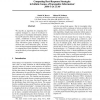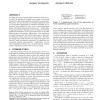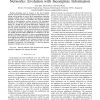15 search results - page 1 / 3 » Computing Best-Response Strategies in Infinite Games of Inco... |
UAI
2004
13 years 5 months ago
2004
We describe an algorithm for computing bestresponse strategies in a class of two-player infinite games of incomplete information, defined by payoffs piecewise linear in agents...
ATAL
2008
Springer
13 years 6 months ago
2008
Springer
We define the class of games called simulation-based games, in which the payoffs are available as an output of an oracle (simulator), rather than specified analytically or using a...
WCNC
2010
IEEE
13 years 8 months ago
2010
IEEE
—Enabling users to connect to the best available network, dynamic network selection scheme is important for satisfying various quality of service (QoS) requirements, achieving se...
GAMESEC
2010
13 years 2 months ago
2010
Abstract. Users of mobile networks can change their identifiers in regions called mix zones in order to defeat the attempt of third parties to track their location. Mix zones must ...
ATAL
2011
Springer
12 years 4 months ago
2011
Springer
We develop an algorithm for opponent modeling in large extensive-form games of imperfect information. It works by observing the opponent’s action frequencies and building an opp...



